Jafra Foundation: Empowering Palestinian Refugees Amidst Challenges
Palestinians in Syria are primarily refugees who originally came from northern Palestine. They arrived in waves after the 1948 occupation of Palestine. By 2011, there were around 650,000 Palestinian refugees in Syria. They enjoyed basic rights like the ability to work and own property, which helped the community thrive and maintain its national identity. This led to Yarmouk Camp becoming a hub for Palestinian refugees, factions, cultural centres and various national organisations, reinforcing their connection to the broader Palestinian community in the region.
The Oslo Accord was catastrophic to the Palestinian cause; it resulted in Palestinian and Palestinian refugees’ rights to return and self-determination being ignored. As a direct threat to their future, this prompted the Palestinian refugees to insist on their cause and legitimate rights.
Moreover, after the Oslo Accord, the main Palestinian leadership group (PLO) and other political parties became much weaker and less resourced. This left many Palestinians feeling lost, alone and without any clear hope or direction for their future.
Palestinian refugees rising up
As a response, the people of the camps came together to create demands and to develop public frameworks, especially regarding the right of return committees and other popular organisations and initiatives; one of which being the Jafra Foundation. Jafra focused on working in the Palestinian camps among Palestinian refugees. We, the Jafra Foundation, aimed to empower the youth, provide and exchange important experiences for young refugees and to promote the Palestinian national identity as well as mechanisms for hope and steadfastness.
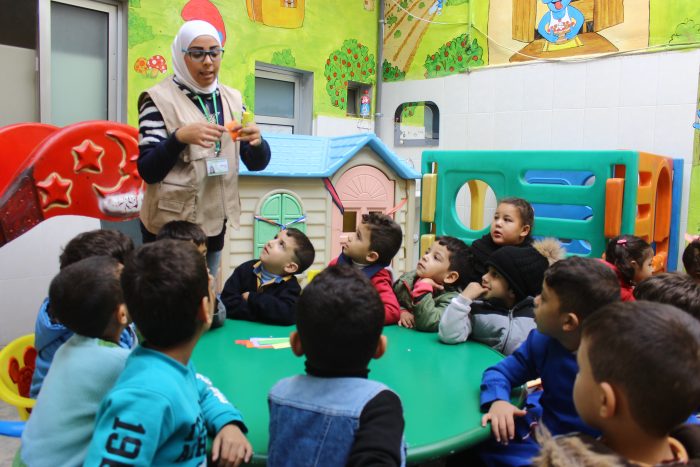
The Jafra Foundation gets to work
It was during this period of hopefulness that the Jafra Foundation was founded by a group of Palestinian youth from diverse political backgrounds. Our mission was developed: empowering Palestinian refugee youth and maintaining their national identity. In 2002, the Jafra Foundation started the “Jafra Youth Center” in the Yarmouk camp, the capital of the Palestinian diaspora, in Damascus, Syria.
Focusing on programs directed at youth and children, the Jafra Foundation’s activities from 2002 to 2011 in Syria centred around empowering and training the Palestinian refugee camp’s youth. Building their skills and experiences so that they can become the Palestinian refugee’s voice, face the Palestinian cause’s elimination efforts, enhance their steadfastness, and activate their participation in their camps. To achieve this, cultural and artistic programs, national events, training courses designed to develop leadership skills, educational activities, computer and English courses, and camps for youth and children are held every year.
Besides hosting many delegations and participants who are in solidarity with the Palestinian cause and refugees across the globe, the foundation participated in many youth camps in several Arab and European countries, exchanging skills and experiences among Palestinian camps, promoting Palestinian cause supporting campaigns, introducing the Palestinian refugees’ issuine, and encountering elimination projects.
The Jafra Foundation continued its social, cultural and youth programs with increased momentum, until the Syrian Crisis in 2011.
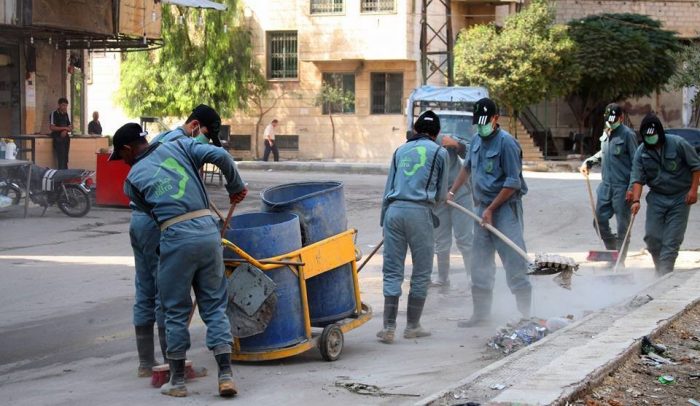
The Syrian War
The advent of the Syrian War brought insecurity, violence and with it, waves of displaced people arriving at the Yarmouk camp in search of shelter and safety. Until the 16th of December 2012, 120 thousand displaced people resided in shelter centres, formerly school buildings, and rented apartments in Yarmouk camp. Most of them were Eastern Ghouta, Qaboun, Homs, Al Hajar Al Aswad, and Al Tadamon residents.
Based on the emerging needs brought about by the crisis, the Jafra Foundation adapted its programs and policies. As a locally based organisation focused on maintaining a holistic approach to aid, we pivoted our primary focus to humanitarian and relief work. This included essential services like waste and water management, sanitation, and distributing food baskets to those in need.
We established teams in camps and other Palestinian communities and expanded our framework to include emergency and humanitarian programs alongside educational and youth activities. Also, we focused on finding alternative and sustainable solutions such as agriculture, waste recycling and education during times of intense emergency, while continuing social and development activities and supporting livelihoods.
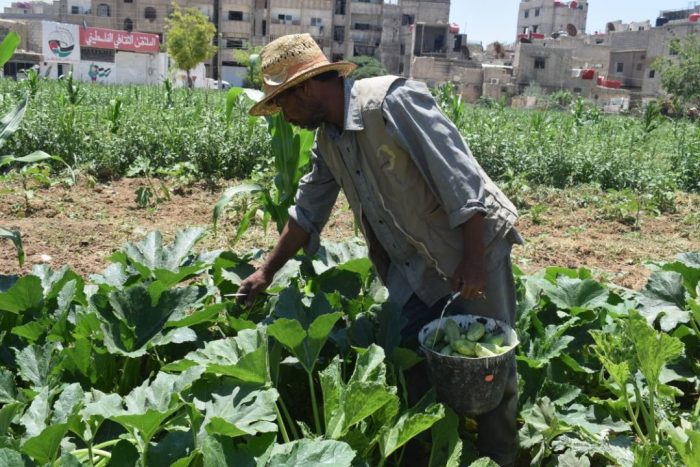
Work in Palestinian refugee camps in Syria
From 2012 to 2022, the Foundation organised these programs in Qudsaya and its suburbs, Jaramana camp, Khan Eshieh camp, Yarmouk camp, Homs camp, and southern Damascus (Yelda – Babila – Beit Sahem), to which Yarmouk camp refugees moved in 2015 after ISIS’s entry into the camp. Also, in Husseiniya, Sahnaya, Barzeh, and other regions, relief/humanitarian campaigns, training courses, or educational activities have been seasonally held.
The Jafra Foundation’s approach was driven by the overwhelming needs of Palestinian refugees both within and outside the camps, intensified by the widespread conflict. As battles engulfed camps like Daraa, Muzayrib, Al Sbeina, Yarmouk, Khan Eshieh, Handarat, and the Husseiniya gathering, and with Yarmouk refugees facing renewed conflict in Qudsaya after displacement, the scope of the disaster demanded a comprehensive response.
Our core mission across all affected regions was to protect Palestinian refugee camps and civilians, especially children. A critical part of this was ensuring children’s education continued. We collaborated with local organisations and educational institutions to provide alternative education services in the most challenging circumstances. By creating safe and friendly spaces, we aimed to prevent children from losing their school years and to offer them a vital opportunity to learn and overcome the trauma they experienced.
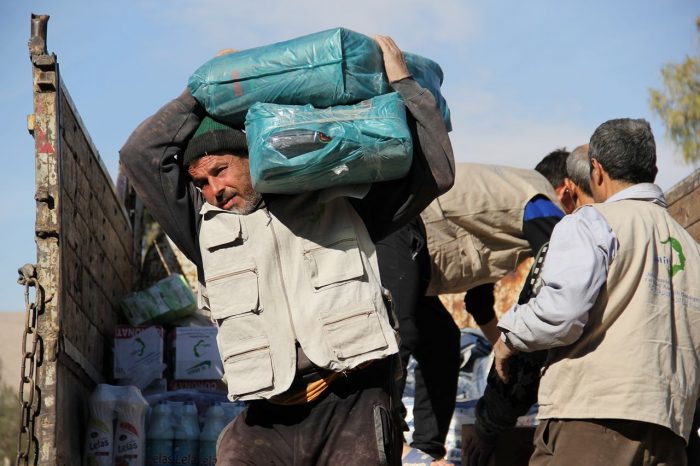
We couldn’t work alone
Here, we must extend our thanks and highest appreciation to the alternative institutions and schools that were formed, especially in the Yarmouk camp and the southern region; this includes Al-Jarmaq alternative school, which did a tremendous job of educating those who remained in the Yarmouk camp. Also, we thank the volunteers from the educational and administrative staff who continued working day and night to protect the educational process, help students enrol in official government exams, and ensure duly recognised results and certificates.
Furthermore, we had a dedicated team of teachers and administrators who worked tirelessly, particularly in Khan Eshieh camp, Qudsaya, Jaramana camp, and Homs. Their efforts made a significant difference, providing crucial preparatory and secondary education services.
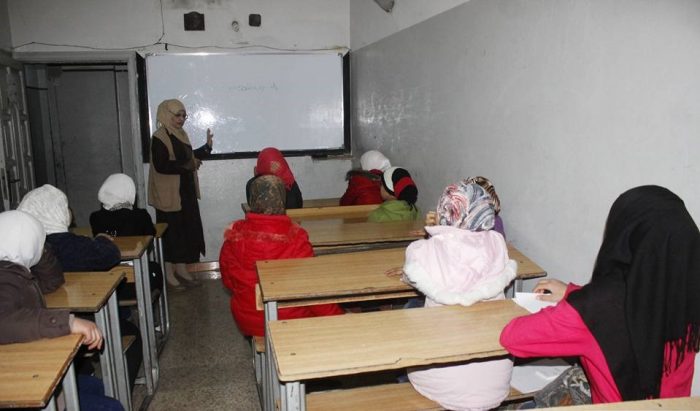
Here, we must extend our thanks and highest appreciation to the alternative institutions and schools that were formed, especially in the Yarmouk camp and the southern region; this includes Al-Jarmaq alternative school, which did a tremendous job on the educational level for the ones who remained in Yarmouk camp. Also, we thank the volunteers from the educational and administrative staff who continued working day and night, trying to save the education process, help students enrol in official government exams, and ensure duly recognised results and certificates.
Furthermore, a great staff of teachers and administrators was active, especially in Khan El-Shiekh camp, Qudsaya, Jaramana camp, and Homs, leaving a positive impact in terms of providing preparatory and secondary certificate education services. In this field, being the head of this staff, many well-known teachers were devoted to educating children and youth and enabling them to pass the preparatory and secondary exams.
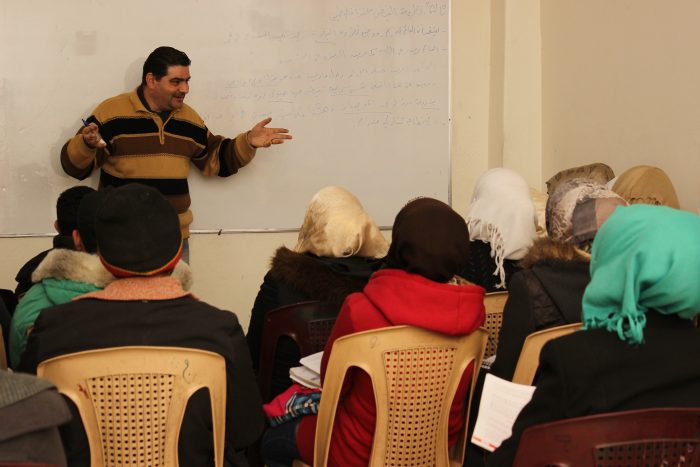
The crisis intensified
The Jafra Foundation gave priority to working in the hardest-to-reach areas, such as Yarmouk and Khan Eshieh camps, where municipal services were suspended and basic services such as water, electricity, health, and cleaning were disrupted. Neighbourhoods became threatened by the spread of diseases.
Naturally, the departure of any area from state control would automatically suspend municipal and UNRWA services there. This contributed to an increased need as well as a decrease or complete interruption in services. In addition, the work of all UNRWA educational, health, and service facilities inside the camp has been suspended for security reasons after the state lost control over these areas.
Also, the departure of any area from the Syrian regime’s control could result in its complete siege or isolation (as is the case with the Yarmouk camp, which was subjected in the period from December 2012 until June 2018 to a partial followed by a complete siege) and then to a limited closure until the government forces regained control. Moreover, the entry of food and health supplies to Khan Eshieh camp and other besieged places at that time was hindered by imposed measures. Additionally, during the first years of the war, military actions hindered the entry of food into Qudsaya town more than once.
From this point on, the Jafra Foundation’s work in the camps began to take on a humanitarian character more or less to include the distribution of food and hygiene aid, heating fuel, drinking water, waste management and sanitation after water cuts. Over the past years, Jafra has secured these services in Yarmouk camp, Khan Esheih camp and southern Damascus, until the local municipalities return to provide basic services after regaining control of them by government forces and the return of UNRWA services.
In a volatile environment, the Jafra Foundation, with international partners, rapidly upskilled its team. Training covered project and organisational management, International Humanitarian Law, protection, safety, financial and logistics management, and risk analysis. Crucially, internal policies and the Foundation’s structure were developed to facilitate expansion while respecting the unique conditions of various camps and regions. Jafra leveraged local Syrian-Palestinian expertise, nurturing it to meet emergency humanitarian demands. The proactive development of contingency plans and “Plan Bs” ensured work continuity, enabling forward planning and preparedness for diverse scenarios.
The Jafra Foundation’s core principle was an unwavering commitment to all affected areas, especially those unreached by UNRWA due to their inaccessibility. We actively fostered communication and dialogue between these isolated camps, always prioritising the interests of refugees and civilians.
This dedication came at a high cost, subjecting the Foundation and its team to immense pressure, including kidnappings, arrests, and even physical liquidation. Despite these grave threats, Jafra remained steadfastly aligned with the Palestinian refugee camps and civilians, advocating for their rights and consistently calling for an end to violence and the neutralisation of refugees from the conflict.
Jafra, with its capacity and growing experience in humanitarian negotiations, has negotiated much food access to besieged areas as well as civil peace and humanitarian ceasefires. The delegation of the Reconciliation Committee in the Qudsaya region was also received in Jafra’s office due to the positive and neutral role played by the Foundation in all its areas of operation.
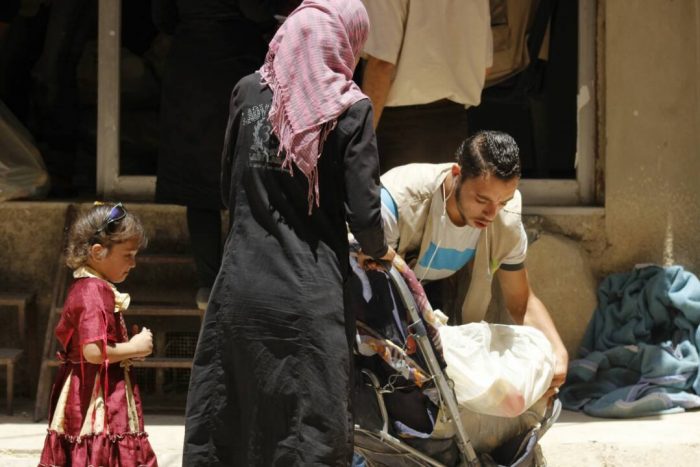
Jafra Foundation in Yarmouk Camp
In Yarmouk camp, repeated displacements led to significant team changes for the Jafra Foundation. However, this challenge also became an opportunity: Jafra volunteers from Yarmouk spread out, joining teams in other camps. These dedicated individuals formed the backbone of relief efforts in Qudsaya and its suburbs, and became the core staff of the main administrative office in Damascus.
Despite facing immense risks and threats — including hostilities, severe shortages of food and medical supplies, and obstacles to sustained education—Jafra’s team in Yarmouk persevered. They never ceased providing critical services, even for a single day. Their continuous efforts included hygiene, water provision, agricultural support, education, activities for children and youth, and the distribution of food and hygiene baskets. Furthermore, Jafra established operational projects within the camp specifically designed to support and empower the most vulnerable households.
Throughout this period, the Foundation actively fostered cooperation and coordination with numerous local humanitarian organisations and active groups in Yarmouk, promoting a vital principle of shared responsibility.
Jafra also made unremitting efforts during the siege of Yarmouk camp and Khan Eshieh camp in order to create safe humanitarian corridors to deliver relief materials to the besieged civilians. The Foundation obtained approval to enter food aid immediately after, allowing UNRWA to enter and deliver aid to Yarmouk.
Meanwhile, the working team in Damascus assumed the issue of coordination, management and logistical support for the Foundation and even the management of human resources, where the number of employees in Jafra, including administrative and educational cadres, volunteers and other working teams, reached about 600. Thus, there was a lot of administrative, financial and logistical work to do, as well as many risks to be avoided.
Beyond direct service provision, Jafra Foundation also recognised the critical need for robust administrative, financial, and logistical expertise. This included developing strong monitoring, evaluation, and follow-up processes as well as a security plan and policies, especially given their collaboration with numerous international humanitarian organisations.
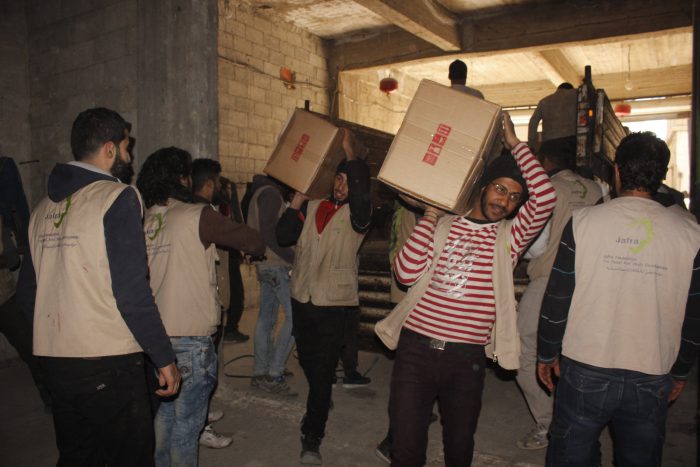
Palestinian refugees after the fall of the regime
The Palestinian refugee population in Syria continues to suffer from the long-term impacts of the war. This is compounded by the collapse of Palestinian political factions and the absence of legitimate national representation. This power vacuum has created a deep gap in political life, leaving refugees without leadership, strategic direction, or protection. The resulting fragmentation has weakened the social fabric of communities and exacerbated humanitarian needs across Palestinian camps—most notably in Yarmouk Camp.
Once known as the capital of the Palestinian diaspora, Yarmouk Camp is now over 70% destroyed. Its residents, most of whom live below the poverty line, face dire conditions with limited or no access to clean water, electricity, sewage systems, healthcare and safe housing. The fall of the former Syrian regime and the emergence of a new government has led to administrative and institutional instability. The new authorities are struggling to manage reconstruction, infrastructure, and security—particularly in marginalised areas like Palestinian camps—due to limited resources and capacity.
This situation has worsened due to the political and financial targeting of UNRWA and a sharp decline in international humanitarian funding. These developments have left tens of thousands of Palestinian refugees with minimal access to education, health services, and basic assistance, increasing their vulnerability and dependency.
Current response and limitations
In the absence of a centralised response, local organisations and grassroots initiatives have become the primary sources of support in Yarmouk and other camps. With limited means, they are working to:
- Reopen roads and clear rubble
- Rehabilitate basic water and power infrastructure
- Distribute food baskets, hygiene kits, and cash assistance to the most vulnerable
Despite their vital role, these efforts face significant challenges:
- Severe funding shortages
- Limited technical expertise and operational capacity
- Lack of a comprehensive coordination framework
A local Relief and Services Office has been established by the current government to help coordinate activities in the camp. However, it remains under-resourced and lacks the tools, authority, and expertise to lead large-scale reconstruction or service provision.
Impact on the wider response in Syria
The crisis in Yarmouk Camp is a reflection of broader issues affecting Palestinian camps across Syria.
Investing in the capacity of local actors and bridging the coordination and resource gaps will:
- Improve access to life-saving services for thousands of families
- Support the continuity and sustainability of humanitarian efforts, particularly in a post-UNRWA context
- Reduce marginalisation and the risk of social instability in already vulnerable communities.
Without urgent and sustained support to strengthen local civil society and coordination systems, humanitarian needs will deepen, and recovery will remain stalled.
